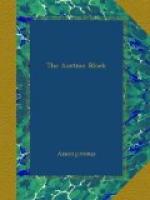Sick with anxiety, weak at thought of the peril to his wife’s health, Bob determined to call upon Max Melcher and demand immunity upon pain of violence. Accordingly he turned his steps in the direction of the Metropolitan Club. But as he neared his destination he found a crowd gathered in front of the place; two patrol-wagons were backed up to the curb opposite the gambling-house; a line of policemen streamed in and out of the premises. Some of the officers were armed with axes and sledges, others carried burdens that evoked jeers and taunts from the bystanders.
Doubting the evidence of his own eyes, Bob elbowed his way closer. It was true! The Metropolitan Club, the oldest, the safest, the best-protected palace of chance in the city, was the object of a daylight raid. Its sacred doors had been battered in, and the fragments of furniture that came out gave evidence that the raiders had used their destructive weapons with unusual violence. Racks of multi-colored ivory chips, faro-layouts, splintered remains of expensive roulette, crap, and poker tables of mahogany and rosewood were flung carelessly into the waiting wagons and driven away. Bob Wharton’s amazement was shared by the onlookers, for nothing like this had even been known in the Tenderloin.
Bob was not a dull young man. In time a light broke through his troubled mind, and he returned to Broadway, lost in thought. Evidently Merkle’s plan was working.
CHAPTER XXVII
Adventures of moment had also fallen to the lot of Jimmy Knight on this day. Lacking the hospitality of Tony’s back room, Jim had of late taken up loafing-quarters in a Seventh Avenue saloon, frequented by a coterie of parasitic young men who subsisted on the crowds which passed daily in and out of the Pennsylvania Station. On the very afternoon of the Melcher raid Jim was sitting at a table with one of these fellows, lending a willing ear to tales of easy money, when he felt a touch upon his shoulder and, looking up, found a plain-clothes man standing over him. The stranger wore no visible badge of authority, but Jim knew him instantly for what he was. In the background another person with the same indefinable stamp of the bull watched proceedings with an expressionless face.
Now Jim had the heart of a rabbit, and, being forever busy in “framing” some one, his first suspicion was that he himself was being framed. This suspicion proved all too correct. Never in his worst dreams had he experienced anything so distressing as what followed his arrest, for it seemed as if these officers cherished a personal grudge against him. They seemed prejudiced for no reason whatever, and they made their aversion patent in several professionally effective ways. Jim found his arms twisted backward and upward until his bones cracked and his joints came loose; with wrists pinioned behind his shoulder-blades and walking on his toes he was propelled into the




